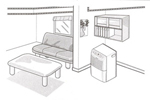For decades, thousands of satisfied homeowners have relied on The B-Dry System to solve their wet basement problems.
For more information, immediate assistance or a free estimate, select one of the options below.

Basement Odors and Musty Smells
Musty basement odor problems are created during the warmer summer months and linger throughout the rest of the year. Because your basement is below ground level, it stays cooler than the rest of your home and cooler than the air outside your home in the warmer seasons.
Warmer air that is allowed to come into your basement through open windows, doors or air leaks in the home shrinks or "condenses" as it comes in contact with cooler basement walls, floors and furnishings. As the air volume shrinks in size, the natural moisture starts to saturate the air causing higher humidity levels.
Excessive moisture or humidity can create the setting for unpleasant odors and a musty basement. When humidity levels are high, excessive moisture from the air is absorbed deep into the fibers or porous materials like wood, insulation, paneling, carpeting, cardboard boxes and your masonry floors and walls. Microbial agents breed in this environment and create the unpleasant smelly odors.
Simply cleaning or shampooing your basement carpeting or cleaning the areas with disinfectant and bleach is not enough. Unless you permanently fix the source of the problem, your musty basement odor will come back.
Remedy: After ruling out any actual water leaks, you must mechanically lower the humidity levels in your basement. This is done through dehumidification.
Set up a good dehumidifier to reduce humidity levels in your basement. By lowering the humidity levels, you are helping to take away the breeding ground for mold, mildew and the other microbial agents that actually cause the bad basement smells.
Keep your basement windows and doors closed year-round to keep additional humidity from entering the space.
Set up a drain hose to your dehumidifier's collection pan so the collected water doesn't build up and turn the dehumidifier off. If your unit stops running, your problem will soon return.
Turn your dehumidifier on high for several weeks to draw the moisture out of the porous items in your basement. Once your basement has dried out, slowly back off the humidistat knob until your dehumidifier shuts off. This should be a good setting to keep your basement dry in the future. Mark the dial with a permanent marker for future reference. If you have digital or electronic controls, write the proper setting on the back of the unit. Once the desired setting is achieved, leave it alone. Your dehumidifier will then turn on automatically when humidity levels rise and will turn off when needed.
Have your wallboard, carpets, furniture and other items cleaned and disinfected. It may not be possible for some items or materials to be cleaned properly and they may have to be discarded. The larger home improvement stores sell products for cleaning and deodorizing your basement carpets, walls, etc. Companies that do carpet cleaning or companies specializing in fire, smoke and water damage can also be of help.
© 2017 B-Dry Owner's Association
RECOMMEND THIS PAGE